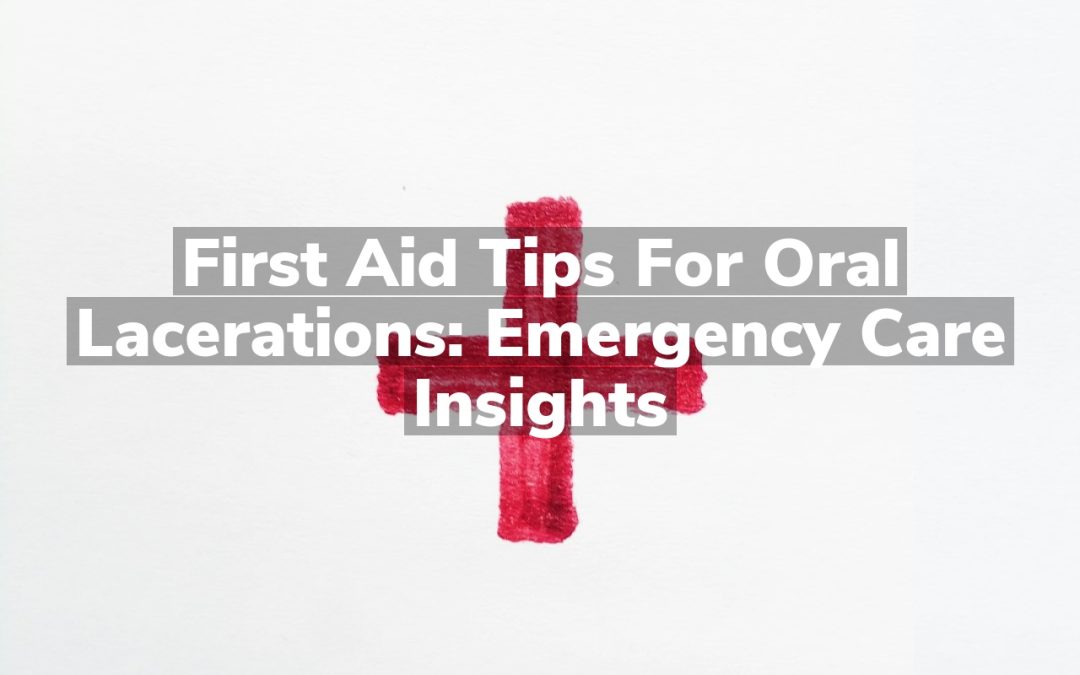Have you ever experienced an oral laceration and didn’t know what to do? Conyers Dental Associates has got you covered with their emergency care insights and first aid tips for oral lacerations. In this post, we’ll provide you with the necessary information to handle such situations.
Types of Oral Lacerations
Oral lacerations are injuries that occur in the mouth, including the lips, tongue, cheeks, and gums. There are three types of oral lacerations: simple, complex, and avulsed. Simple lacerations are minor cuts that do not require stitches and can be treated at home. Complex lacerations are deeper cuts that may require stitches and medical attention. Avulsed lacerations occur when a tooth is knocked out of its socket, and emergency dental care is necessary.
If you experience a simple oral laceration, rinse your mouth with warm salt water and apply pressure to the area with a clean cloth or gauze. For complex lacerations, seek medical attention immediately. If you have an avulsed laceration, try to save the tooth by placing it back in the socket or in a container of milk and seek emergency dental care. For more information on relieving toothaches quickly, check out our Essential Guidance for Relieving Toothaches Quickly guide. Remember, it is important to seek medical attention for any oral laceration to prevent infection and ensure proper healing.
Immediate First Aid Steps
Oral lacerations can be painful and scary, but it’s important to act quickly to prevent further damage and promote healing. The first step is to rinse your mouth with warm salt water to clean the wound and reduce the risk of infection. Apply pressure to the area with a clean cloth or gauze to stop any bleeding. If the bleeding doesn’t stop after 10-15 minutes, seek emergency dental services immediately.
If the laceration is severe, you may need stitches or other medical treatment. In this case, it’s important to seek immediate dental service in Conyers. Delaying treatment can lead to complications and prolong the healing process. Remember, quick action can make all the difference in preventing further damage and promoting a speedy recovery.
If you’re experiencing an oral laceration, don’t hesitate to seek emergency dental services. Immediate treatment can help prevent complications and promote healing. Contact us at Conyers Dental Associates for immediate dental service in Conyers.
When to Seek Medical Attention
While minor oral lacerations can be treated at home, there are certain situations where seeking medical attention is necessary. If the laceration is deep, bleeding heavily, or involves a large area of the mouth, it is important to seek emergency medical care immediately. Additionally, if the injury is accompanied by severe pain, difficulty breathing, or swelling, it is crucial to seek medical attention as soon as possible. Delaying treatment in these situations can lead to further complications and potentially life-threatening conditions. Remember, it is always better to err on the side of caution and seek medical attention if you are unsure about the severity of the injury.
Preventing Oral Lacerations
Preventing oral lacerations is the best way to avoid the pain and discomfort that comes with them. To prevent oral lacerations, it is important to avoid biting down on hard objects, such as ice or hard candy. Additionally, wearing a mouthguard during sports or other physical activities can help protect your mouth from injury. It is also important to avoid chewing on objects such as pens or pencils, as this can lead to accidental cuts and lacerations. By taking these simple precautions, you can reduce your risk of oral lacerations and keep your mouth healthy and pain-free.
Common Complications and Treatments
Oral lacerations can lead to various complications, including infection, excessive bleeding, and nerve damage. Infection can occur if the wound is not properly cleaned and treated, leading to swelling, pain, and fever. Excessive bleeding can be a result of a deep cut or a severed blood vessel, which may require stitches or cauterization. Nerve damage can cause numbness or loss of sensation in the affected area. Treatment for oral lacerations may include cleaning the wound, applying pressure to stop bleeding, and administering antibiotics or pain medication. In severe cases, surgery may be necessary to repair the damage. It is important to seek emergency care immediately if you experience an oral laceration to prevent complications and ensure proper treatment.
Conclusion
Don’t suffer from toothaches any longer, call Conyers Dental Associates at 770-483-6655 for quick relief and check out our reviews on Google Maps.

